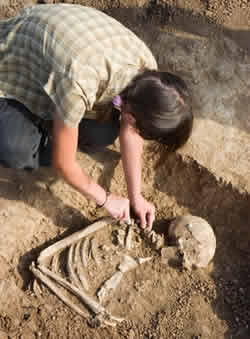Difference between Archaeologist and Antiquarian
Key Difference: An archaeologist deals with the field work that might consist of digging and restoring artifacts, or human-made objects, from ancient ruins. Antiquarians, also known as antiquary, mainly deal with the antiquities or things of the past.
 There is an important difference between archaeologist and antiquarian. The most significant difference between both the terms is that an archaeologist is generally affiliated with artifacts, or the things which human left behind, whereas, an antiquarian is concerned with his own private collection and study of history.
There is an important difference between archaeologist and antiquarian. The most significant difference between both the terms is that an archaeologist is generally affiliated with artifacts, or the things which human left behind, whereas, an antiquarian is concerned with his own private collection and study of history.
Archaeologists mainly study about the human past and present, through the materials which humans left behind. The materials that humans used, made, or modified are studied by archaeologists. They analyze skeletal remains and artifacts, such as tools, pottery, cave paintings, and ruins of buildings. The term is derived from the Greek word archaiologia, where archaio means “ancient” and logos means “science” and “study”. Archaeology is the science which deals with the study of ancient times. It provides an insight of the ancient times by analyzing the remained materials belonging to that time. It aims to preserve the history for present and future learning. In simple terms, an archaeologist deals with the field work that might consist of digging up and restoring artifacts, or human-made objects from ancient ruins.
 Antiquarians, also known as antiquary, mainly deal with the antiquities or things of the past. Also, and most frequently in modern usage, an antiquarian is a person who deals with or collects unusual and ancient "antiquarian books". The term is derived from the Latin word, antiquaries, meaning “pertaining to ancient times”. Antiquarians is the mixture of archaeology and philology. The Antiquary is a homelier and more modest person. One will see him hunting old curiosity shops and old book stalls. Antiquarianism could not be called a science; it prepared the way for science. It is a study, a recreation, an amusement or a hobby, but even thus it has its uses and pleasures. Antiquarians can be anyone who hold the knowledge of history, or have a library of old books, but they are not archaeologists.
Antiquarians, also known as antiquary, mainly deal with the antiquities or things of the past. Also, and most frequently in modern usage, an antiquarian is a person who deals with or collects unusual and ancient "antiquarian books". The term is derived from the Latin word, antiquaries, meaning “pertaining to ancient times”. Antiquarians is the mixture of archaeology and philology. The Antiquary is a homelier and more modest person. One will see him hunting old curiosity shops and old book stalls. Antiquarianism could not be called a science; it prepared the way for science. It is a study, a recreation, an amusement or a hobby, but even thus it has its uses and pleasures. Antiquarians can be anyone who hold the knowledge of history, or have a library of old books, but they are not archaeologists.
Comparison between Archaeologist and Antiquarian:
|
|
Archaeologist |
Antiquarian |
|
Description |
Archeologist deals with the study of ancient times. It provides an insight into the ancient times by analyzing the remained materials belonging to that time. |
An antiquarian is concerned with his own private collection and study of history. |
|
Pronunciation |
ahr-kee-ol-uh-jist |
an-ti-kwair-ee-uhn |
|
Origin of the word |
Greek archaiologia – "ancient" and logia "word" or "study." |
Greek antiquaries – “pertaining to ancient times” |
|
Degree |
Generally, require a Ph.D. |
Generally, require a Ph.D. |
|
Fields |
Archaeometry – Artifact analysis, remote sensing, and radiocarbon dating like techniques are used in this field. Underwater Archeology – underwater evidence are associated with it. Classical – study of more civilized societies. Environmental – the principles of the subject are applied to the study of environment. Pseudo – a non-scientific approach is used. Ethno – focuses on creating connection between the past and the present. Historical – pertaining to the ancient historical sites. |
Antiquarians mainly focus on history. They deal with the history books, and only study about the past and re-write the old books, if needed/required. |
|
Distinction |
Archaeology is the science. |
Antiquarianism is an art. |
|
Famous personalities |
Leslie Alcock - His major excavations include Dinas Powys hill fort in Wales and Cadbury Castle in Somerset. Anthony Aveni - known for his contributions to the field of archaeoastronomy. |
Fred Rsenstock - a legend in biography books and arts. Philip Norman - he is an English novelist, biographer, journalist and playwright. |
Image Courtesy: archaeologytoday.net, bernarms.blogspot.in









Add new comment